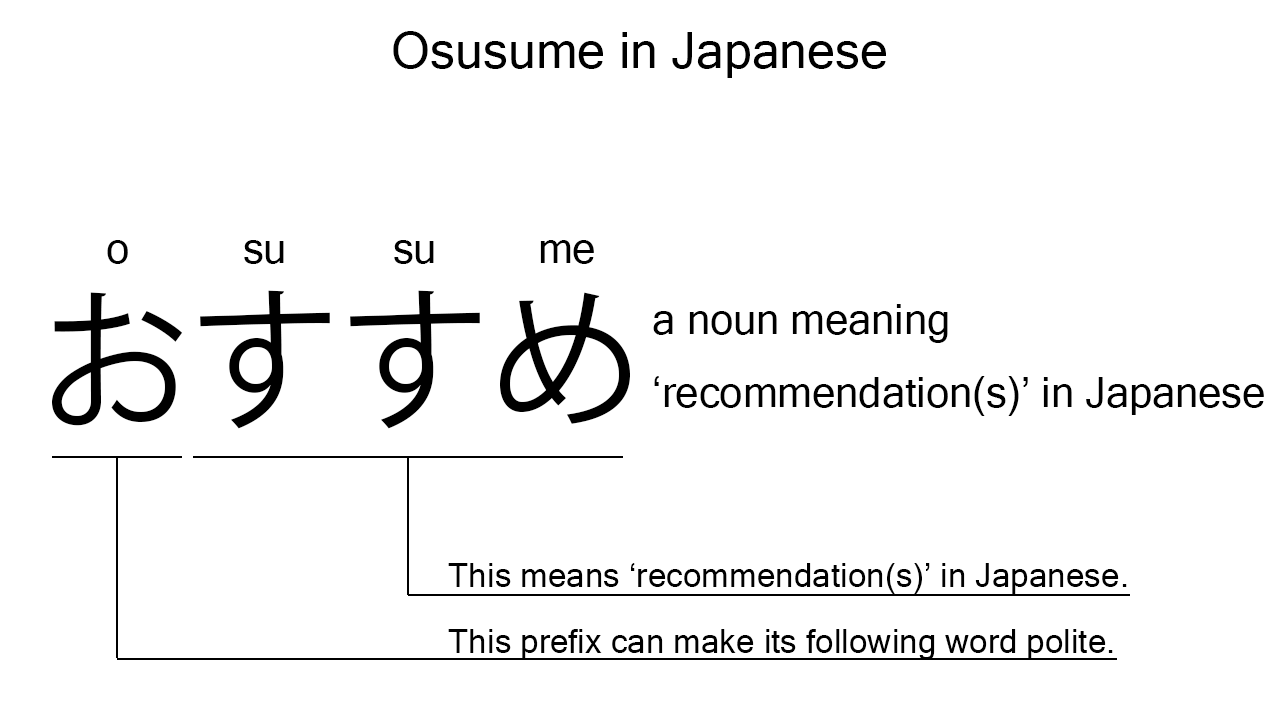What does “osusume” mean in Japanese?
Native speakers say “osusume” to mean ‘recommendation’ in Japanese. Perhaps, some Japanese learners know this word as it is sometimes used in Japanese shops, restaurants, bars, and the like. In this blog post, however, I will explain this word in detail based on its grammatical components. And also, I will explain how to use it through example sentences. My explanations would help Japanese learners understand “osusume” more clearly. Then, let’s get started!
Contents
Definition and meaning of “osusume”
Let me start with the definition and meaning of “osusume”.
- osusume – おすすめ : a noun meaning ‘recommendation’ in Japanese. This can also work as plural. Learn more about Japanese plural.
This can be written in kanji, but Japanese people often write this in hiragana. It’s also worth mentioning here that this can be written in even katakana in more casual situations like in shops and bars. In this blog post, however, I will focus on its hiragana expression.
The definition and meaning are simple and clear. To understand this noun more clearly, however, let me explain its grammatical components in detail, one by one.
What does “osusume” literally mean in Japanese?
“Osusume” consists of the following two components:
- o – お : a prefix making its following word polite.
- susume – すすめ : a noun meaning ‘recommendation’ in Japanese.
These two components tell us that “osusume” is literally the polite expression of “susume” and thus politely means ‘recommendation’ in Japanese. To tell the truth, we can use “susume” alone to mean ‘recommendation’ in Japanese, but somehow it sound more formal than its polite expression. Perhaps this sounds a bit weird to Japanese learners, but sometimes this kind of shift can happen. Japanese people use polite expressions way too often, resulting in losing their original politeness.

When we meet new Japanese words, we should check their grammatical components in detail to understand their meanings clearly and deeply. In many cases, components tell us a lot about the meanings of the words they form. Actually, here, we could get the better understanding of “osusume” through the detailed check above.
So far, I’ve explained the definition and meaning of “osusume” together with its grammatical components. Then, let me explain how to use it through the example sentences below.
Example #1: how to say “recommendation” in Japanese
kore ga watashi no osusume desu – これが私のおすすめです (これがわたしのおすすめです)
This is my recommendation.
Below are the new words used in the example sentence.
- kore – これ : a demonstrative pronoun used to refer to something close to the speaker. In the example, this is used to mean ‘this’ in Japanese.
- ga – が : a case particle used to make the subject word or the object word in a sentence. In the example, this is used after “kore” to make the subject in the sentence.
- watashi – 私 (わたし) : a pronoun meaning ‘I’ in Japanese.
- no – の : a case particle used after a noun or pronoun to make its possessive case. In the example, this is used after “watashi” to make its possessive case, “watashi no“, which means ‘my’ in Japanese.
- desu – です : an auxiliary verb used after a noun or adjective to make it polite. Probably, this is well known as a part of Japanese desu form. In the example, this is used after the noun phrase, “watashi no osusume”, to make it sound polite.
This is a typical usage of “osusume”. In this example, it works together with the possessive case, “watashi no”, to mean ‘my recommendation’ in Japanese.
Example #2: another usage of “osusume”
osusume wa nan desu ka – おすすめは何ですか (おすすめはなんですか)
What is your recommendation?
Below are the new words used in the example sentence.
- wa – は : a binding particle working as a case marker or topic marker. In the example, this works after “osusume” to make the subject in the sentence.
- nan – 何 (なん) : an interrogative pronoun often used to mean ‘what’ in Japanese. The usage is very similar to that of “what” in English questions, but this Japanese pronoun doesn’t necessarily come to the beginning of a sentence.
- ka – か : a sentence-ending particle used to make a question. As the definition suggests, this is used at the end of the example sentence to make the question.
This is another typical usage of “osusume”. When we want to mean ‘recommendation’ in Japanese, anyway, this noun is always a very good option.
Summary
In this blog post, I’ve explained the definition and meaning of “osusume” in detail based on its grammatical components. And also, I’ve explained how to use it through the example sentences. Let me summarize them as follows.
- osusume – おすすめ : a noun meaning ‘recommendation’ in Japanese. This can also work as plural. This noun consists of two grammatical components: “o” and “susume”. The first one is a prefix making its following word polite; the second one means ‘recommendation’. So, this is literally the polite expression of “susume” and thus means ‘recommendation’ politely in Japanese.
Hope my explanations are understandable and helpful for Japanese learners.